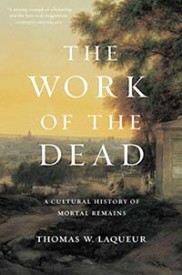Berkeley historian excavates tales of the dead
In a wide-ranging conversation with Fresh Air's Terry Gross, Berkeley historian Thomas Laqueur talks about our evolving relationship with the dead and how the landscaped, secular cemeteries of today trace their roots to the French Revolution.

December 16, 2015
As the son of a pathologist, “I lived in a family in which the dead were present,” Thomas Laqueur tells Fresh Air’s Terry Gross in a recent radio interview.
 In the course of their wide-ranging conversation, Laqueur discusses how the landscaped secular cemeteries of today — from San Francisco’s Colma to Boston’s Mount Auburn and Brooklyn’s Green-Wood — are products, ultimately, of the French Revolution.
In the course of their wide-ranging conversation, Laqueur discusses how the landscaped secular cemeteries of today — from San Francisco’s Colma to Boston’s Mount Auburn and Brooklyn’s Green-Wood — are products, ultimately, of the French Revolution.
The French revolutionaries “created the first cosmopolitan community of the dead, which was Père Lachaise — which was explicitly not just for Christians, it was explicitly cosmopolitan,” Laqueur says. “The Russian could lie next to the Spaniard, the Jew next to the Christian” — creating “a new kind of community of the dead.”
The UC Berkeley historian examines the cultural significance of human remains, and evolving customs for their handling, in a new book titled The Work of the Dead.
Listen to his conversation with Terry Gross about the book — and his enduring interest in how humans give meaning to their bodies, living or dead — on Fresh Air.